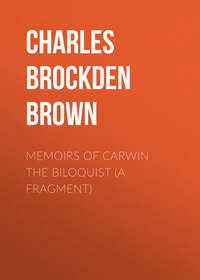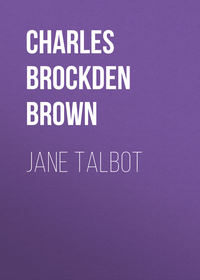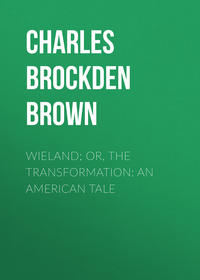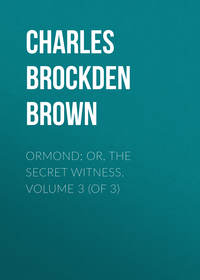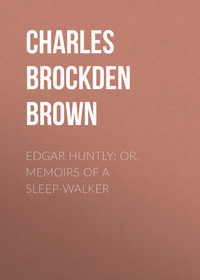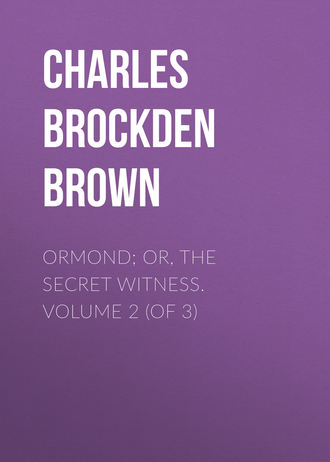 полная версия
полная версияOrmond; Or, The Secret Witness. Volume 2 (of 3)
Constantia paused at this relation. Her thoughts had recently been fixed upon Sophia Westwyn. Since their parting four years before she had heard no tidings of this woman. Her fears imagined no more probable cause of her friend's silence than her death. This, however, was uncertain. The question now occurred, and brought with it sensations that left her no power to move: – was this the guest?
Her doubts were quickly dispelled, for the stranger taking a light from the table, and not brooking the servant's delays, followed Fabian to the chamber of his mistress. She entered with careless freedom, and presented to the astonished eyes of Constantia the figure she had met at Roseveldt's, and the purchaser of her lute.
The stranger advanced towards her with quick steps, and mingling tones of benignity and sprightliness, said: —
"I have come to perform a duty. I have received from you to-day a lute that I valued almost as my best friend. To find another in America, would not, perhaps, be possible; but, certainly, none equally superb and exquisite as this can be found. To show how highly I esteem the gift, I have come in person to thank you for it." – There she stopped.
Constantia could not suddenly recover from the extreme surprise into which the unexpectedness of this meeting had thrown her. She could scarcely sufficiently suppress this confusion to enable her to reply to these rapid effusions of her visitant, who resumed with augmented freedom: —
"I came, as I said, to thank you, but to say the truth that was not all, I came likewise to see you. Having done my errand, I suppose I must go. I would fain stay longer and talk to you a little. Will you give me leave?"
Constantia, scarcely retrieving her composure, stammered out a polite assent. They seated themselves, and the visitant, pressing the hand she had taken, proceeded in a strain so smooth, so flowing, sliding from grave to gay, blending vivacity with tenderness, interpreting Constantia's silence with such keen sagacity, and accounting for the singularities of her own deportment in a way so respectful to her companion, and so worthy of a steadfast and pure mind in herself, that every embarrassment and scruple were quickly banished from their interview.
In an hour the guest took her leave. No promise of repeating her visit, and no request that Constantia would repay it, was made. Their parting seemed to be the last; whatever purpose having been contemplated appeared to be accomplished by this transient meeting. It was of a nature deeply to interest the mind of Constantia. This was the lady who talked with Roseveldt, and bargained with Melbourne, and they had been induced by appearances to suppose her ignorant of any language but French; but her discourse, on the present occasion, was in English, and was distinguished by unrivalled fluency. Her phrases and habits of pronouncing were untinctured by any foreign mixture, and bespoke the perfect knowledge of a native of America.
On the next evening, while Constantia was reviewing this transaction, calling up and weighing the sentiments which the stranger had uttered, and indulging some regret at the unlikelihood of their again meeting, Martinette (for I will henceforth call her by her true name) entered the apartment as abruptly as before. She accounted for the visit merely by the pleasure it afforded her, and proceeded in a strain even more versatile and brilliant than before. This interview ended like the first, without any tokens on the part of the guest, of resolution or desire to renew it; but a third interview took place on the ensuing day.
Henceforth Martinette became a frequent but hasty visitant, and Constantia became daily more enamoured of her new acquaintance. She did not overlook peculiarities in the conversation and deportment of this woman. These exhibited no tendencies to confidence or traces of sympathy. They merely denoted large experience, vigorous faculties, and masculine attainments. Herself was never introduced, except as an observer; but her observations on government and manners were profound and critical.
Her education seemed not widely different from that which Constantia had received. It was classical and mathematical; but to this was added a knowledge of political and military transactions in Europe during the present age, which implied the possession of better means of information than books. She depicted scenes and characters with the accuracy of one who had partaken and witnessed them herself.
Constantia's attention had been chiefly occupied by personal concerns. Her youth had passed in contention with misfortune, or in the quietudes of study. She could not be unapprised of contemporary revolutions and wars, but her ideas concerning them were indefinite and vague. Her views and her inferences on this head were general and speculative. Her acquaintance with history was exact and circumstantial, in proportion as she retired backward from her own age. She knew more of the siege of Mutina than that of Lisle; more of the machinations of Cataline and the tumults of Clodius, than of the prostration of the Bastile, and the proscriptions of Marat.
She listened, therefore, with unspeakable eagerness to this reciter, who detailed to her, as the occasion suggested, the progress of action and opinion on the theatre of France and Poland. Conceived and rehearsed as this was with the energy and copiousness of one who sustained a part in the scene, the mind of Constantia was always kept at the pitch of curiosity and wonder.
But, while this historian described the features, personal deportment, and domestic character of Antoinette, Mirabeau and Robespierre, an impenetrable veil was drawn over her own condition. There was a warmth and freedom in her details, which bespoke her own co-agency in these events, but was unattended by transports of indignation or sorrow, or by pauses of abstraction, such as were likely to occur in one whose hopes and fears had been intimately blended with public events.
Constantia could not but derive humiliation from comparing her own slender acquirements with those of her companion. She was sensible that all the differences between them arose from diversities of situation. She was eager to discover in what particulars this diversity consisted. She was for a time withheld, by scruples not easily explained, from disclosing her wishes. An accident, however, occurred to remove these impediments. One evening this unceremonious visitant discovered Constantia busily surveying a chart of the Mediterranean Sea. This circumstance led the discourse to the present state of Syria and Cyprus. Martinette was copious in her details. Constantia listened for a time; and, when a pause ensued, questioned her companion as to the means she possessed of acquiring so much knowledge. This question was proposed with diffidence, and prefaced by apologies.
"Instead of being offended by your question," replied the guest, "I only wonder that it never before occurred to you. Travellers tell us much. Volney and Mariti would have told you nearly all that I have told. With these I have conversed personally, as well as read their books; but my knowledge is, in truth, a species of patrimony. I inherit it."
"Will you be good enough," said Constantia, "to explain yourself?"
"My mother was a Greek of Cyprus. My father was a Slavonian of Ragusa, and I was born in a garden at Aleppo."
"That was a singular concurrence."
"How singular? That a nautical vagrant like my father should sometimes anchor in the Bay of Naples; that a Cyprian merchant should carry his property and daughter beyond the reach of a Turkish sangjack, and seek an asylum so commodious as Napoli; that my father should have dealings with this merchant, see, love, and marry his daughter, and afterwards procure from the French government a consular commission to Aleppo; that the union should in due time be productive of a son and daughter, – are events far from being singular. They happen daily."
"And may I venture to ask if this be your history?"
"The history of my parents. I hope you do not consider the place of my birth as the sole or the most important circumstance of my life."
"Nothing would please me more than to be enabled to compare it with other incidents. I am apt to think that your life is a tissue of surprising events. That the daughter of a Ragusan and Greek should have seen and known so much; that she should talk English with equal fluency and more correctness than a native; that I should now be conversing with her in a corner so remote from Cyprus and Sicily, are events more wonderful than any which I have known."
"Wonderful! Pish! Thy ignorance, thy miscalculation of probabilities is far more so. My father talked to me in Slavonic; my mother and her maids talked to me in Greek. My neighbours talked to me in a medley of Arabic, Syriac, and Turkish. My father's secretary was a scholar. He was as well versed in Lysias and Xenophon as any of their contemporaries. He laboured for ten years to enable me to read a language essentially the same with that I used daily to my nurse and mother. Is it wonderful then that I should be skilful in Slavonic, Greek, and the jargon of Aleppo? To have refrained from learning was impossible. Suppose, a girl, prompt, diligent, inquisitive, to spend ten years of her life partly in Spain, partly in Tuscany, partly in France, and partly in England. With her versatile curiosity and flexible organs would it be possible For her to remain ignorant of each of these languages? Latin is the mother of them all, and presents itself of course to her studious attention."
"I cannot easily conceive motives which should lead you before the age of twenty through so many scenes."
"Can you not? You grew and flourished, like a frail mimosa, in the spot where destiny had planted you. Thank my stars, I am somewhat better than a vegetable. Necessity, it is true, and not choice, set me in motion, but I am not sorry for the consequences."
"Is it too much," said Constantia, with some hesitation, "to request a detail of your youthful adventures?"
"Too much to give, perhaps, at a short notice. To such as you my tale might abound with novelty, while to others, more acquainted with vicissitudes, it would be tedious and flat. I must be gone in a few minutes. For that and for better reasons, I must not be minute. A summary at present will enable you to judge how far a more copious narrative is suited to instruct or to please you."
END OF VOL. II1
Similar exploits are related of Count de la Lippe and Wortley Montague.


